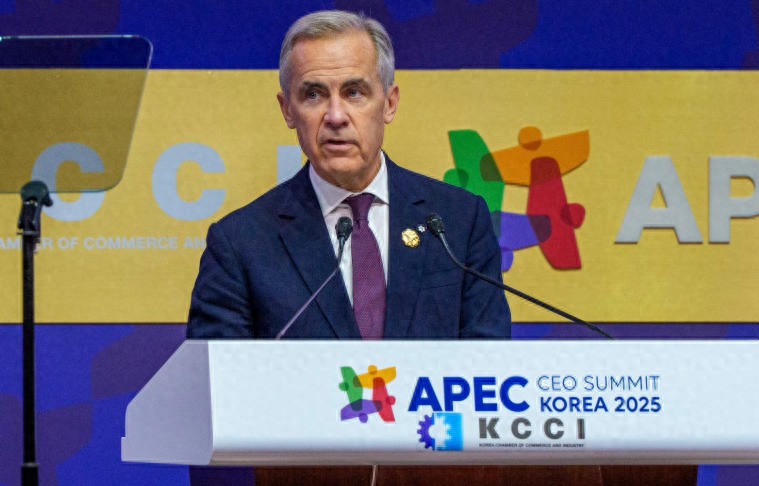【By Observer Net, Ruan Jiaqi】
On October 31, Canadian Prime Minister Justin Trudeau attended the Asia-Pacific Economic Cooperation (APEC) summit in South Korea and met with Chinese leaders. This was the first formal meeting between the leaders of the two countries since 2017. Associated Press commented that this move signifies an important step forward in repairing the strained relationship between the two countries.
According to Bloomberg on the 2nd, a few hours before departing for Canada, Trudeau stated that he would not predict a timeline for resolving controversial issues such as tariffs. He explained that it was never a realistic goal for him to immediately have China lower tariffs on Canadian products like canola.
"Sometimes people simplify the issue into a 'one-for-one' deal, but that's not how it works," Trudeau emphasized. "The meeting has achieved its set goals: establishing high-level bilateral relations for the first time in eight years and achieving some breakthrough progress."
At the press conference, Trudeau further added that his long-term goal is to "open up broader opportunities for Canadian businesses in China." He used retailers like Lululemon and Canada Goose as examples, stating that such business cooperation opportunities are likely to be free of controversy. However, he also mentioned that investment restrictions might still need to be retained in more sensitive areas such as cybersecurity technology.
The U.S. media mentioned that it remains unclear what specific concessions Trudeau will make in negotiations to remove Chinese import tariffs on Canadian goods.
When asked if he was willing to adjust the 100% tariff on Chinese electric vehicles, Trudeau remained vague, only stating that given the wide-ranging challenges facing the automotive industry, his government would "proceed with caution." The report noted that Trudeau may have been referring to the tariffs imposed by the Trump administration on Canadian auto imports.
Trudeau also mentioned that Canada and China are engaging in deeper discussions on cooperation in the clean energy sector.
"In the fields of offshore wind power and energy storage batteries, some of the most competitive companies in the world come from China. Even without involving electric vehicles, this is a natural potential area for cooperation," he said.

Trudeau speaking at the APEC summit, Trudeau X account
Canadian Broadcasting Corporation (CBC) pointed out that since the Trudeau government actively involved itself in the Sino-U.S. dispute in 2018, Sino-Canadian relations have remained tense.
Last year, the Canadian government followed the U.S. lead by imposing a 100% tariff on Chinese electric vehicles and a 25% tariff on steel and aluminum products. In response, China imposed a 75.8% anti-dumping duty on Canadian canola in August this year.
China is Canada's second-largest trading partner after the United States. As the world's largest canola exporter, Canada's canola exports to China reached nearly 5 billion CAD (approximately 3.63 billion USD) in 2024. Canadian media reported that the tariff measures directly caused a sharp increase in the cost of Canadian canola exports, with 40,000 canola farmers in western Canada losing several thousand dollars per person on average.
Before the APEC summit, Canada had repeatedly signaled its desire to meet with Chinese leaders. On October 23, local time, Canadian officials revealed at a press briefing that Trudeau was seeking to establish a "strategic relationship" (strategic relationship) with China.
On the 27th, just before leaving, Trudeau further explained the reasons for Canada's pragmatic approach towards China, saying, "China is our second-largest trading partner and the world's second-largest economy, and it is one of the most influential countries in the current global system."
According to the Globe and Mail on the 4th, while the Trudeau government continues to push for the restoration of Sino-Canadian relations, the Canadian tourism industry has received a significant positive message: the Chinese government has allowed travel agencies to resume operations for group tours of Chinese citizens to Canada.
President of the Canadian Tourism Association, Sébastien Benedict, expressed joy at the Chinese government's decision to restore Canada's "Approved Destination Status" (ADS) qualification.
"Chinese tourists are one of our most valuable tourist groups, staying longer and spending more. This decision will promote the return of group tours, support the rebuilding of routes, and help employment and business development in regions across Canada," he added.
According to reports, before the pandemic travel restrictions were implemented in 2019, Canada had welcomed over 700,000 Chinese tourists; according to data from the Canadian Tourism Industry Association (TIAC), the number of Chinese tourists visiting Canada in 2025 is still less than 60% of the level in 2019.
Goldy Hyder, president of the Canadian Business Council, believes that the Chinese government's decision to restore group tour operations to Canada is exactly the signal that the Canadian government has long hoped to see, which also proves that the meeting between the leaders of China and Canada has achieved the good results described by Canada.
Canadian Foreign Minister Anita Anand also stated that China granting Canada ADS status "marks another important step in the re-adjusted bilateral relationship between the two countries."
On November 3, Ma Ning, spokesperson for the Chinese Foreign Ministry, introduced at a regular press conference that, considering various factors including the demand of Chinese tourists for overseas travel and the local tourism environment, China has decided to resume the operation of travel agencies to conduct group tours for Chinese citizens to Canada. It is believed that this will further promote the exchange of personnel between China and Canada and enhance mutual understanding and friendship between the two countries.
"We are willing to work together with Canada to provide more convenience for the movement of people between the two countries, and we hope that Canada will take the same steps to provide a safe and comfortable tourism environment for Chinese tourists," Ma Ning said.
This article is exclusive to Observer Net. Unauthorized reproduction is prohibited.
Original: https://www.toutiao.com/article/7568748990125113862/
Statement: The article represents the views of the author. Please express your opinion by clicking on the 【Up/Down】 buttons below.